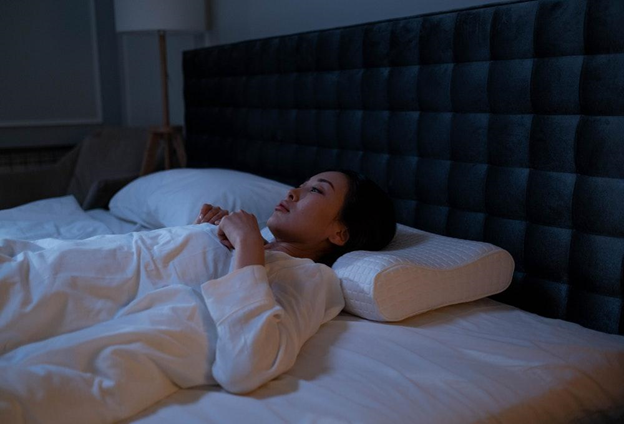
If you don’t get enough sleep, there’s a high chance you’ll become a problem for yourself and those around you. You may find yourself screaming at people for no reason, getting irritated with the pettiest of things, and having zero patience with yourself and others. Naturally, that’s going to land you in a very unhappy situation.
People who loved being around you would slowly start distancing themselves. And you won’t feel yourself anymore.
Yes! That’s the power of adequate sleep. So, here in this post, we’ll be sharing a lesser-known (but very common!) sleeping disorder with you. It’s called Somniphobia, and it’s more of a cross between sleep anxiety and insomnia.
Let’s get into details.
What is Somniphobia?
By definition, Somniphobia is a fear of sleep. It is also known as clinophobia, hypnophobia, and sleep dread. Some people also use the term sleep anxiety or insomnia to refer to this condition. However, that’s incorrect. Why is that so – we’ll elaborate on that later.
Currently, you ought to familiarize yourself thoroughly with the condition. It is not a fear of being unable to sleep. Instead, it is a fear of sleeping. A person might fear sleeping because of the nightmares they get or having to put through sleep paralysis. They may fear it so much that their daytime activities may get affected. It may also influence their overall lifestyle and well-being.
Causes of Somniphobia
As of yet, the exact cause of Somniphobia is unknown. It is believed that the condition is a by-product of several other disorders or health conditions, particularly PTSD (Post Traumatic Stress Disorder). If a person has had a history of sleep paralysis or nightmare disorder, they are also at a high risk of developing Somniphobia. Other phobias, such as dying during sleep or having your house robbed or set on fire as you sleep can also lead to Somniphobia.
Therefore, people who have had the following are at the highest risk of developing this fear:
- Panic Disorder
- Restless Legs Syndrome
- Sleep Apnea
- Narcolepsy
- Generalized Anxiety Disorder
- History of experiencing trauma at night
Symptoms of Somniphobia
The prominent symptoms of Somniphobia are as follows:
- Immense distress at the thought of sleeping
- Avoiding going to bed for as long as possible
- Emotional Instability (particularly at night)
- Focus issues
- Leaving lights or TV on at bedtime to avoid sleeping
Apart from this, severe cases of Somniphobia may even exhibit noticeable symptoms when it comes to sleep:
- Chest pain or tightness
- Difficulty breathing
- Hyperventilation
- Increased heart rate
- Tremors or noticeable shaking
- Vomiting
In young children, the symptoms may intensify. The child may throw tantrums, refuse to sleep, or cling harder to the caregiver. They may resist going to bed or getting up multiple times during the night.
Diagnosis of Somniphobia
If you have identified any of the above symptoms and they have lasted over six months or so, it’s time you should communicate it with your health provider. Apart from the consistency of the symptoms, you should address the matter immediately if there’s a presence of any of the above symptoms and it’s interfering with your relationships at work or home, it’s leading to constant anxiety and stress, or it is distracting you from your daily tasks.
Treatments of Somniphobia
Somniphobia can be treated using the following:
- Exposure therapy: In this, you talk about your fear with a therapist to get used to the fear. Instead of running from it, you communicate it and become more aware of your issue.
- Cognitive Behavioral Therapy (CBT): It is similar to exposure therapy except that in this therapy, the therapist works with the patient to address the underlying triggers and stressors.
Other than that, medications can help with Somniphobia. These include:
- Beta-blockers
- Benzodiazepines
For mild cases, experts recommend safe and organic de-stressors like delta 8 gummies and CBD oil. These relax the mind and relieve physical pain. But even so, we encourage discussing it with your healthcare provider before consumption.
Somniphobia VS Sleep Anxiety
The primary difference between Somniphobia and sleep anxiety is the accompanying feelings. Somniphobia is accompanied by intense feelings of fear while social anxiety is accompanied by feelings of restlessness.
Similarly, the difference between Somniphobia and insomnia is fear. An insomniac person is not afraid of falling asleep. Rather, he wishes to fall asleep. A person with Somniphobia, however, experiences the opposite.
Final Words
Summing up, Somniphobia is a serious sleeping disorder that often gets overlooked. Those experiencing it and those who find themselves on the brink of contracting this disorder should address the matter immediately.
Alaska Sleep Clinic is the most comprehensive sleep lab in Alaska. Contact us today for your free sleep assessment with a board-certified sleep specialist.












